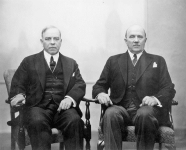Ernest Lapointe
1876-1941

Lapointe helped King win the Liberal leadership in 1919 and subsequently served in several portfolios in King’s cabinets. He advocated successfully for greater Canadian autonomy within the British empire, promoted bilingualism in government and worked to maintain harmonious relations between French and English Canadians. A Member of Parliament for 37 consecutive years, he successfully ensured a voice for francophone Quebec in Ottawa during his long term of office.
Lapointe lived at 324 Chapel St. between 1924 and 1931 in what is still an intact example of a Queen Anne Revival residence.
Lapointe moved his family to Chapel St. after he was named justice minister in the King government and rented the ground floor of the converted mansion. Conveniently, the house is only half a block away from Laurier House where King had his principal office. Lapointe moved to Quebec City in 1931 to join a law practice (he was still an MP but the Liberals were now in opposition since they had lost the 1930 election).
Lapointe was a large man, a dynamic speaker and had a jovial personality which made him a popular MP. He was Minister of Justice and Attorney General (1926-1930) and Secretary of State (1926) for the first few years he lived on Chapel St. It was during that time that his department paid the legal costs of the “Famous Five” Alberta women seeking legal clarity on whether women could be appointed to the Senate.
From 1924, he was the most important federal politician in Quebec, serving as King’s lieutenant in that province (and delivering most of its MPs to the Liberal Party election after election). Lapointe was instrumental in keeping the Liberals in power (with the support of small parties) after the 1925 election when they won fewer seats than the Conservatives and King himself was defeated in his riding.
In 1927, Lapointe was one of the movers behind the Dominion-Provincial constitutional conference, the most important inter-governmental meeting since Confederation, which discussed matters such as senate reform and a procedure to amend the constitution. He also was a leading figure at the 1929 London conference that eventually led to the 1931 Statute of Westminster that recognized the full autonomy of British dominions.
Jack Pickersgill, King’s private secretary, noted that King relied on Lapointe’s advice in all matters. A week before Lapointe died of cancer in 1941, King wrote in his diary that he had told Lapointe that “no man ever had a truer friend. But for him, I would never have been P.M. nor would I have been able to hold the office as I had held it through the years. That there was never a deeper love between brothers than existed between us. That we had never had a difference all the years that we had been associated together, in thought and word alike. That I was grateful to him from the bottom of my heart.”
